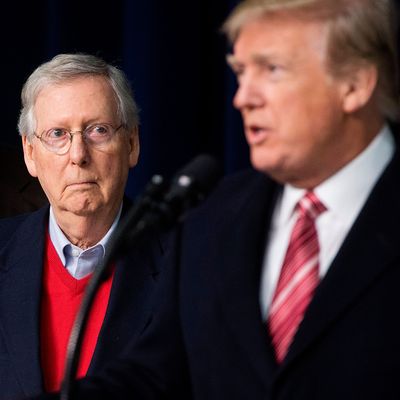
“President Trump is remaking the Republican economic playbook in his own image,” reports the Washington Post, “abandoning ideological consistency in favor of a debt-busting strategy that will upend how Washington taxes and spends trillions of dollars each year.” The story is an echo of the Republican Party’s own response to the evident failure of its fiscal program, which is doubling the budget deficit during peace and prosperity. The attempts to suggest Trump betrayed some previously healthy ideal of budgetary rectitude — remaking, abandoning — combined with the implication that it somehow grows out of his personality — his own image — represent the party’s utterly predictable efforts to explain away its already-collapsing promises.
Trump has not abandoned Republican economic policy. He has carried it out faithfully. The party’s attempts to pin its collapse on his personal shortcomings of willpower are a completely predictable part of how that policy takes shape.
Any attempt to define this administration’s domestic program as reflecting the president’s personal identity has to grapple with the fact that it has precisely replicated the last Republican administration’s economic philosophy. The parallels between Trumpism and Bushism are almost eerie. Trump, like Bush, has filled the Executive branch with former and likely future lobbyists who “regulate” the industries they used to represent. (As a former coal lobbyist now working for Trump’s Energy Department staffers recently told a coal-mining conference: “I went to Washington, D.C., for one purpose and that was to help create coal jobs in the United States. That’s my total purpose for being there. I’m not a researcher, I’m not a scientist, I’m an advocate for the coal industry.”) Also like Bush, he has filled the bureaucracy with underqualified hacks. (Most recently, we learned that the acting chief of the Federal Railroad Administration was continuing to work for a public relations firm in Mississippi despite holding a putative full-time government job overseeing an agency with a $1.7 billion budget.)
What explains these choices? Trump’s lack of government experience and high tolerance (bordering on outright enthusiasm) for corruption haven’t hurt. But mainly he has defaulted to the preferences of his party’s existing power structure.
That explains why Trump has prioritized a tax-cut plan whose benefits disproportionately accrue to the wealthiest Americans and higher military spending: Republican elites strongly favor those priorities. And it also explains why he financed them with borrowing: The budget trade-offs necessary to pay for those things would blow up in Republicans’ faces. Under the George W. Bush presidency, Republicans enacted sweeping tax cuts and higher military spending, and promised the ensuing growth would pay for it all. (i.e., Bush from 2003: “These proposals will help stimulate investment and put more people back to work … that growth will bring the added benefit of higher revenues for the government.”) When that failed, they would blame Congress for spending too much (i.e., Bush from 2007: “What we need is spending discipline in Washington, D.C.”).
It might seem, on the surface, as though Republicans have thought seriously about their budgeting dilemma since the last time they held power. The party underwent a high-profile exercise in self-flagellation, decrying the excessive debt of the Bush era and demanding higher standards. But the high standards really only applied to the Obama administration. As soon as they regained power, all the factors that caused them to jack up the deficit under Bush remained in place. They still really wanted to give rich people a tax cut, still wanted more money for defense, and still realized they had no way to pay for it without generating a gigantic backlash.
And so they have retraced their steps. First, they cut taxes and promised it would create enough growth to bring down the deficit. (Paul Ryan: “We do fundamentally believe that this tax code and this tax reform will give us faster economic growth. Faster economic growth helps raise the economy, which raises revenues. And that helps us tackle the deficit.”) When the deficit instead skyrockets, they blame spending. Budget Director Mick Mulvaney says he would have voted against the budget deal Trump signed. Trump himself bemoans its “waste.”
Meanwhile, Trump’s allies have already begun to blame his big-spending ways for the swelling deficit. When Republican fiscal policy caused a debt explosion under Bush, conservatives blamed his “compassionate conservatism.” Bush was not a true believer, you see. Therefore his deficits did not count against conservatism.
They are now applying the same ideological disowning to Trump. Today alone, conservatives including Brian Riedl, Victor Davis Hanson, and Brandon Weichert have published the requisite denunciations of the administration’s spendthrift ways. Most of the spending increase was on the military, which conservatives support, and the cost of the spending pales beside the revenue loss from the tax cuts. But the point is to absolve their principles by separating them from the man who implements them.
The Post story channels this vein of intraparty criticism. “Trump, who proclaimed “I love debt” in a 2016 interview, showed little concern about relying on heavy borrowing in his business career,” it reports. “A political chameleon who has shifted between the two parties numerous times, Trump has never embraced the sort of austerity favored by budget cutters such as Ryan.” Of course, Ryan supported every bill Trump signed. He also supported all the bills increasing the deficit under Bush. Indeed, Ryan has had far more influence on the design of fiscal policy than has Trump, who happily signs anything the Congress shoves in front of his face.
Blaming the president’s idiosyncratic personality traits is a way for conservatives to avoid confronting the complete unworkability of their fiscal model. In reality, Trump did not remake the Republican economic playbook in his own image. Republicans remade the Trump economic playbook in theirs.






























